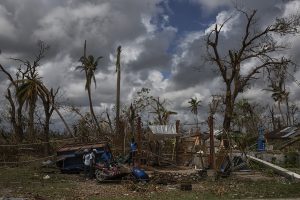October saw continued investment in rural communities as evidenced by financial support for a number of climate resilience-building projects around the world. These initiatives focus on sustainable development within the agriculture and fisheries sectors, strengthening natural resource management, including water, and enhancing community resilience to better cope with the effects of extreme weather patterns and climate change, for instance drought. Economic losses and costs of recovery in the wake of extreme and slow onset events take a heavy toll on countries’ ability to invest in achieving the SDGs, including poverty reduction, health and education. This Update informs of relevant data findings, reported adaptation finance, new partnerships among development banks aimed at boosting resilience and options for adaptation finance, including from the private sector.
Challenges related to accessing funding from climate funds remain, and the impact of international finance will be limited unless it is accompanied by additional public and private resources. These are some of the takeaways from a UNFCCC technical paper (FCCC/TP/2019/3) titled, ‘Opportunities and Options for Adaptation Finance, Including in Relation to the Private Sector,’ released in October in advance of the UN Climate Change Conference in Madrid, Spain. The paper provides an overview of the global adaptation finance landscape, offers insights to assessing the impact of adaptation finance, and examines the link between adaptation planning, such as domestic expenditure alignment, and maximized finance. Other key messages include:
- The public sector can support unlocking and scaling up private sector investment in adaptation by de-risking these investments, increasing demand for adaptation products and services and supporting the suppliers of these products and services.
- Policymakers can also impose requirements on the private sector to invest in adaptation efforts relevant to their businesses. This could include, for example, using laws and regulations to ensure that sectors within a country are obligated to invest in adaptation efforts for the ecosystems and communities on which their businesses depend.
- Robust national adaptation planning processes that engage the private sector and integrate gender considerations will enable countries to catalyze large-scale finance for adaptation that addresses the needs of the most vulnerable.
- Ensuring that technology needs assessments (TNAs) and technology action plans (TAPs) are up to date is an important first step towards commercializing adaptation technologies. The private sector is already investing in adaptation technologies, but a combination of awareness raising and new financing mechanisms can help to expand this market.
- Understanding how adaptation investments enhance adaptation action is crucial and can be enhanced by developing national adaptation monitoring and evaluation systems and linking national monitoring of progress on adaptation with monitoring related to international frameworks.
The document will be used to produce a summary for policymakers prior to the 25th session of the Conference of the Parties (COP 25) to the UNFCCC.
IFAD, Partners Provide Over USD 200 Million to Support Climate-resilient Farmers
Three new funding initiatives by the International Fund for Agricultural Development (IFAD) and partners, totaling over USD 200 million, will support small-scale farmers and fishermen in Chad, Samoa and Sudan.
Drought-affected small-scale farmers in Chad look to increase their food security and income through the ‘Strengthening Productivity and Resilience of Agropastoral Family Farms Project.’ The focus of the EUR 81.9 million initiative is on: strengthening agricultural water infrastructure; rehabilitating rural feeder roads; intensifying and diversifying family farming production systems; supporting value addition for agropastoral products; improving nutrition and adult literacy; supporting farmers’ organizations; and improving access to financial services. Project funding includes a EUR 49.3 million grant and a EUR 5.3 million loan from IFAD and co-financing from a Green Climate Fund (GCF) grant (EUR 17.1 million), the government (EUR 7.6 million) and the beneficiaries themselves (EUR 2.6 million).
IFAD and partners also seek to support rural livelihoods and strengthen community resilience in Samoa to better cope with the effects of extreme weather patterns with a USD 30 million ‘Samoa Agriculture and Fisheries Productivity and Marketing Project.’ Besides implementing disasters-resilient infrastructure, this involves assisting smallholder farmers to produce local, diverse and climate-smart crops and integrate production into commercial value chains, including for export and domestic markets. Funding includes a USD 3.6 million grant from IFAD and co-finance from the government (USD 0.74 million), the International Development Association (IDA) (USD 20 million), the private sector (USD 1.54 million) and beneficiaries (USD 4.45 million).
Sudan’s new EUR 77.7 million ‘Sustainable Natural Resources and Livelihoods Programme’ supports poor smallholder farmers in improving their natural resources management and income, with special attention given to youth (30% of participants) and women (50% of participants). Financing includes a EUR 45.2 million grant and a EUR 11.3 million loan from IFAD, and co-financing from a Global Environment Facility (GEF) Least Developed Countries Fund (LDCF) grant (EUR 1.8 million), the government (EUR 11.7 million), the private sector (EUR 3.3 million) and the beneficiaries themselves (EUR 4.4 million).
Sudan received further support from the African Development Bank (AfDB) with a USD 31.3 million project grant for climate change resilience building. Specifically focusing on water and sanitation facilities, the project is aided with an additional USD 1.3 million grant from the Rural Water Supply and Sanitation Initiative Trust Fund.
World Bank Supports Smallholder Farmers in India, Inclusive and Sustainable Growth in Cameroon
The International Bank for Reconstruction and Development (IBRD) supported the ‘Odisha Integrated Irrigation Project for Climate Resilient Agriculture’ in India with a USD 165 million loan, which has a six-year grace period and a maturity of 24 years. The project aims at strengthening the resilience of smallholder farmers against adverse climate change impacts by improving access to resilient seed varieties and production technologies, diversifying towards more climate-resilient crops, and improving access to better water management and irrigation services.
The World Bank approved a USD 200 million Development Policy Credit for Cameroon to strengthen fiscal sustainability and support sustainable growth through the implementation of economic reforms, improvements in agriculture and livestock sectors, energy, transport, healthcare, education and social safety net for the most vulnerable.
Adaptation Fund Board Approves USD 63 Million in New Projects
The Adaptation Fund Board approved over USD 63 million in grant funding for new projects during its 34th meeting in October. The Board decided to streamline its project proposals review process and enhance coordination with the GCF, including to improve efficiency of fast-track accreditation and reaccreditation processes and advance options for fund-to-fund arrangements.
The Board approved six adaptation projects totaling over USD 52 million in:
- the Republic of Congo, to build adaptive capacity to climate change in vulnerable communities;
- El Salvador, to enhance climate resilience of rural communities and ecosystems in Ahuachapán- Salvador;
- Georgia, to modernize and diversify sustainable and climate-smart dairy industry through improved natural resource management;
- Malawi, to integrate risk management and enhance market opportunities for resilient food security and livelihoods;
- Moldova, to build capacity and agro-ecological and social resilience to climate change; and
- a regional project in Djibouti, Kenya, Sudan and Uganda, to strengthen drought resilience for smallholder farmers and pastoralists.
The Board further approved USD 10 million for two innovation pilot programmes, which will provide grants to countries that do not yet have ‘Direct Access’ entities, and to the private sector to foster innovation in several adaptation sectors. The UN Development Programme (UNDP) and the UN Environment Programme (UNEP) will administer these grants.
The new grant window projects approved by the Board include:
- for Armenia, a small innovation grant aimed at engaging future leaders through a digital education module on adaptation challenges and best practices for youth;
- for Chile, a small innovation grant, for improving water access in emergency situations in a vulnerable province of Valparaiso; and
- for Rwanda, a USD 560,000 project scale up grant aimed at reducing climate change vulnerability in northwest Rwanda through community-based adaptation (CBA).
MDB Partnerships Seek to Strengthen Climate Resilience
Also in October, the AfDB launched the ‘Africa Disaster Risks Financing Programme’ in Madagascar, in partnership with the government and the African Risk Capacity (ARC). The programme will support participation in the African Risk Capacity sovereign risk transfer mechanism. The AfDB and ARC will jointly prepare, develop and implement projects and programmes in climate change and risk resilience in member countries. ARC will assist member countries with policies on drought risk pools and other sovereign disaster risk measures. In Madagascar, the Programme aims to strengthen resilience and capacity to manage climate-related disasters over the next five years, including by evaluating disaster risk and providing early warning systems and contingency plans.
The European Investment Bank (EIB) and the Caribbean Development Bank (CDB) agreed on a Procurement Procedural Framework in support of climate-resilient projects across the region. The agreement addresses a common challenge faced by institutions that co-finance projects – increasing coherence and development impact. Avoiding inconsistencies, CBD President William Warren Smith explained, allows for “more efficient project appraisal and project execution.”
Sendai Framework Monitor Data Show Critical Infrastructure Threatened by Climate Crisis
The Sendai Framework for Disaster Risk Reduction (DRR) is a 15-year voluntary, non-binding agreement which recognizes that the state has the primary role to reduce disaster risk but that responsibility should be shared with other stakeholders, including local government, the private sector and other stakeholders. It aims to substantially reduce disaster risk and losses in lives, livelihoods and health, as well as in the economic, physical, social, cultural and environmental assets of persons, businesses, communities and countries.
To date, 126 countries are reporting on disaster losses through the online Sendai Framework Monitor, based on data from national disaster loss databases. Analyzed by the UN Office for Disaster Risk Reduction (UNDRR, formerly known as UNISDR), the data reveal that, inter alia:
- Since 2005, on average, more than 3,200 schools have been damaged or destroyed each year in a baseline sample of extensive risk in 83 countries while, on average, over 412 health facilities have been damaged or destroyed every year.
- Between 2005 and 2017, over 3,200 kilometers of roads have been damaged or destroyed in these same 83 countries from small and medium disasters alone.
Mega-disasters such as hurricanes, earthquakes and tsunamis have been excluded from the data sets, to ensure that the statistics reflect long-term disaster trends and that the analysis focuses on “extensive risk,” which manifests as large numbers of recurrent, low-to-medium severity disasters mainly associated with localized hazards such as flash floods, landslides, urban flooding, storms, fires and other time-specific events.
* * *
The SDG Knowledge Hub publishes monthly climate finance updates, which largely focus on multilateral financing and cover, inter alia, mitigation and adaptation project financing news and lessons, institutional events and news, and latest developments in carbon markets and pricing. Past climate finance updates can be found under the tags: Finance Update: Climate Change; and Finance Update: Sustainable Energy.
SDGs
Issues
- Agriculture & Food Security,
- Adaptation,
- Integrated Water Resources Management,
- Irrigation,
- Sanitation,
- Biodiversity,
- Ecosystem Approach,
- Climate Change,
- Disasters & Humanitarian Relief,
- Economics & Investment,
- Energy,
- Sustainable Use,
- Gender,
- Governance,
- Health,
- Human Settlements & Population,
- Land,
- Monitoring & Evaluation,
- Oceans & Coasts,
- Poverty Eradication,
- Sustainable Development,
- Stakeholder Participation,
- Transport,
- Water & Sanitation


